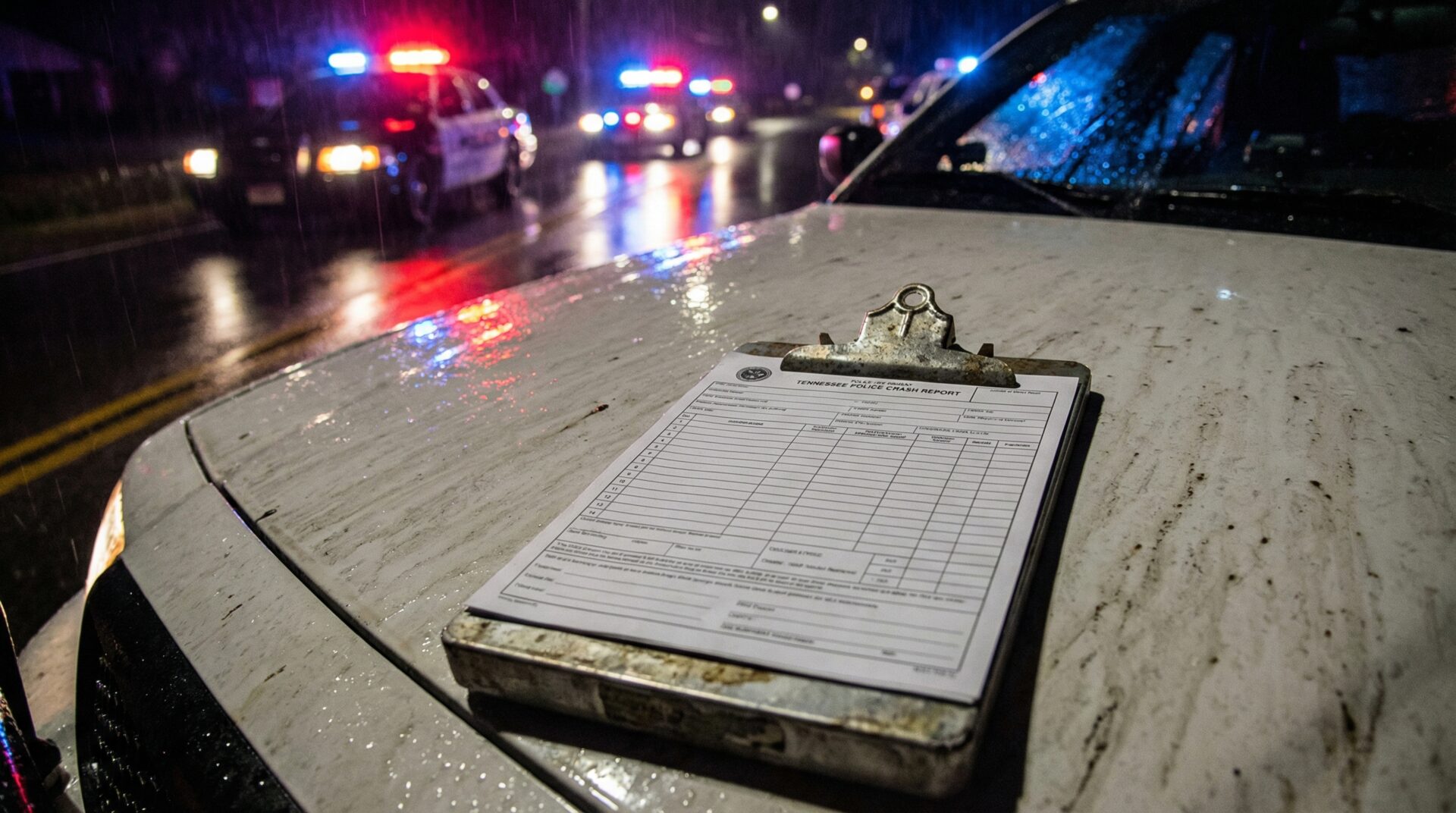Police reports matter after a crash — they document what happened, who was involved, and sometimes which driver was cited. But in Tennessee, a police report does not legally decide civil fault. Insurers and, if necessary, juries make their own determinations using all available evidence.
Here’s what to know if a report seems to point the finger at you.
Under Tennessee’s modified comparative fault rule (Tenn. Code Ann. § 29-11-103), your compensation is reduced by your percentage of fault and barred only if you reach 50% or more. That percentage comes from the total evidence, not from the accident report alone.
What a Police Report Is (and Isn’t)
In Tennessee, officers create a crash report to record the scene: locations, vehicles, statements, diagrams, and any citations issued. The report is important evidence, but:
- It is not a court judgment and doesn’t automatically control civil liability.
- It may contain errors or incomplete information gathered under time pressure.
- It may include opinions or preliminary assessments that can be challenged.
The Tennessee Department of Safety & Homeland Security provides the reporting framework and forms used by law enforcement across the state.
Before the police report is locked in, double-check easy-to-fix items: your name, contact information, insurance info, vehicle VIN/plate, time of crash, road names, weather conditions, and the diagram arrows showing direction of travel.
Common Report Errors You Can Correct Early
- Lane position or turning movements drawn incorrectly on the diagram
- Distances, speeds, or lighting conditions guessed instead of measured
- One-sided witness statements when other witnesses were present
- Missed contributing factors (debris, sightline obstructions, malfunctioning signals)
- Medical complaints noted as “none” before symptoms appeared hours later
Why Insurers Treat Reports as a Starting Point
Insurance adjusters rely on police reports for early decisions, but they also weigh:
- Photos and videos (scene, dashcam, nearby cameras)
- Witness interviews and 911 audio
- Vehicle damage patterns and repair estimates
- Roadway design, traffic controls, and sightlines
- Medical records and timelines of treatment
If you disagree with how the report frames the crash, you can present additional evidence. A well-documented challenge can change the assigned percentage of fault.
How to Get and Fix Your Tennessee Crash Report
- Order the report quickly: The state’s “Obtaining a Crash Report” page (tn.gov/safety/tnhp/crashreport.html) explains how to purchase it online or in person.
- Ask the officer for a supplemental report if key facts were missed; you can provide photos, measurements, or witness contacts to support corrections.
- Keep a dated log of your communications with the adjuster so you can show how you challenged the police report’s errors.
- If the insurer leans too heavily on the police narrative, insist they consider physical damage, medical timelines, and third-party evidence — not just the report’s shorthand boxes.
Citations vs. Civil Liability
Getting a traffic ticket after a crash can feel like the end of the story. It isn’t. A citation can influence how an adjuster views the case, but civil fault is decided separately. A jury can find that, even with a citation, the other driver bears the majority of responsibility.
How to Challenge an Unfair Fault Determination
If the insurer assigns you too much fault based on the report:
- Request the adjuster’s specific basis for their percentage.
- Provide clarifications and corrections (e.g., lane positions, distances, timing).
- Share additional records: surveillance footage, expert opinions, roadway measurements.
- Point out inconsistencies between the narrative, diagram, and physical damage.
- Consider an attorney’s help to organize and present the evidence.
When Cases Go to Trial
When settlement talks break down, jurors review the evidence and apply Tennessee’s civil jury instructions on negligence, causation, and damages. Police reports themselves are often limited at trial under the Rules of Evidence, so jurors usually hear live testimony and see exhibits instead of relying on the written report. The jury decides how to apportion fault among drivers — not the officer who wrote the report.
We’re Here to Help
If you were injured in a car, truck, or motorcycle accident — even if a police report seems to blame you — don’t give up. In Tennessee, the report doesn’t decide civil fault, and you may still recover significant compensation with the right evidence.
Our team at Stillman & Friedland helps injury victims across Tennessee understand their rights, correct the record, and deal with insurance companies that try to shift blame.
Call 615-244-2111 or reach out through our online contact form. We’ll listen, explain your options, and help you take the next step toward recovery.
Because we care,
Stillman & Friedland







